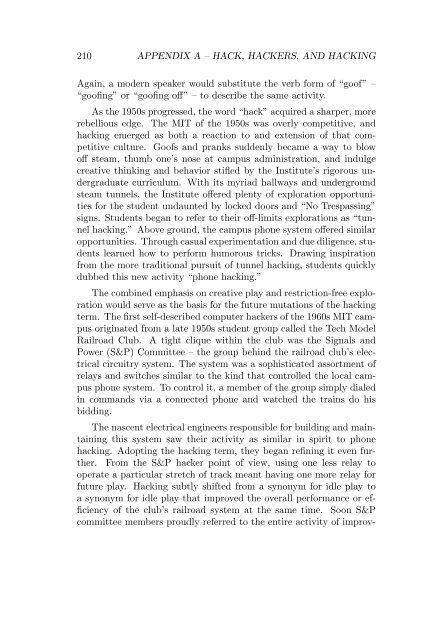Create successful ePaper yourself
Turn your PDF publications into a flip-book with our unique Google optimized e-Paper software.
210 APPENDIX A – HACK, HACKERS, AND HACKING<br />
Again, a modern speaker would substitute the verb form of “goof” –<br />
“goofing” or “goofing off” – to describe the same activity.<br />
As the 1950s progressed, the word “hack” acquired a sharper, more<br />
rebellious edge. The MIT of the 1950s was overly competitive, and<br />
hacking emerged as both a reaction to and extension of that competitive<br />
culture. Goofs and pranks suddenly became a way to blow<br />
off steam, thumb one’s nose at campus administration, and indulge<br />
creative thinking and behavior stifled by the Institute’s rigorous undergraduate<br />
curriculum. With its myriad hallways and underground<br />
steam tunnels, the Institute offered plenty of exploration opportunities<br />
for the student undaunted by locked doors and “No Trespassing”<br />
signs. Students began to refer to their off-limits explorations as “tunnel<br />
hacking.” Above ground, the campus phone system offered similar<br />
opportunities. Through casual experimentation and due diligence, students<br />
learned how to perform humorous tricks. Drawing inspiration<br />
from the more traditional pursuit of tunnel hacking, students quickly<br />
dubbed this new activity “phone hacking.”<br />
The combined emphasis on creative play and restriction-free exploration<br />
would serve as the basis for the future mutations of the hacking<br />
term. The first self-described computer hackers of the 1960s MIT campus<br />
originated from a late 1950s student group called the Tech Model<br />
Railroad Club. A tight clique within the club was the Signals and<br />
Power (S&P) Committee – the group behind the railroad club’s electrical<br />
circuitry system. The system was a sophisticated assortment of<br />
relays and switches similar to the kind that controlled the local campus<br />
phone system. To control it, a member of the group simply dialed<br />
in commands via a connected phone and watched the trains do his<br />
bidding.<br />
The nascent electrical engineers responsible for building and maintaining<br />
this system saw their activity as similar in spirit to phone<br />
hacking. Adopting the hacking term, they began refining it even further.<br />
From the S&P hacker point of view, using one less relay to<br />
operate a particular stretch of track meant having one more relay for<br />
future play. Hacking subtly shifted from a synonym for idle play to<br />
a synonym for idle play that improved the overall performance or efficiency<br />
of the club’s railroad system at the same time. Soon S&P<br />
committee members proudly referred to the entire activity of improv-


